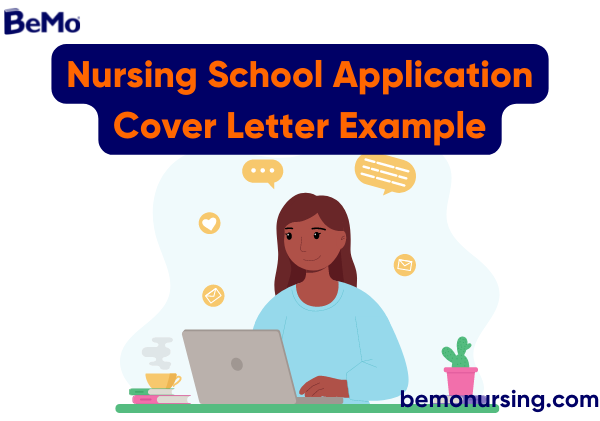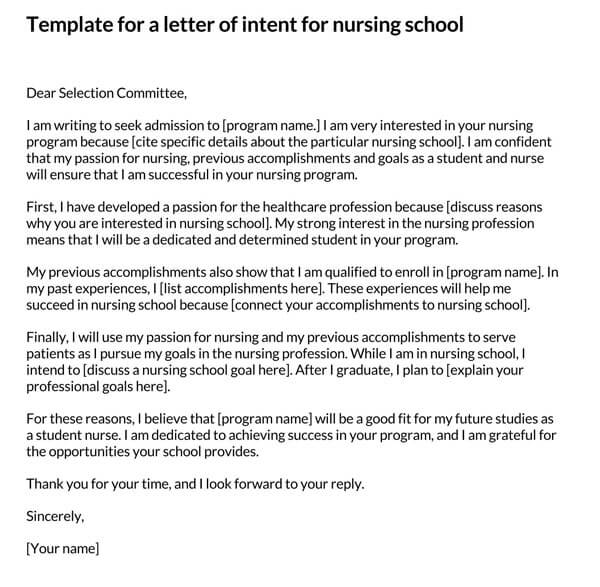Published in
Letter Templates

Letter of Intent for Nursing School (With Samples)
A letter of intent for nursing school is written to explain your goals qualifications and interest in a nursing school. When writing a letter of interest for nursing school, you should focus on explaining why you are interested in nursing school and what parts of your background make you a suitable candidate for nursing school as well as your ambitions after you graduate. With a high-quality letter of intent, you can get accepted into a nursing school that will start off your nursing admission and help you pursue your career goals.
Download Templates
The quality and content of your Letter of intent for nursing school will determine your chances of getting selected as a student in any nursing school, hence it is important that you ensure that your letter of intent for nursing school provides a clear representation of you, your accomplishments and your passion for the nursing profession. Download our well-researched, impeccable written, and proven templates today to give yourself an edge in the selection process.

How to Write a Letter of Intent for Nursing School
A letter of intent for nursing school should be well-written and highlight all the reasons you should be considered as a candidate. Here are some steps to guide you through the process of writing a letter of intent for nursing school to kick-start your nursing school application process:
Address the letter to the head
When addressing the letter, it is important to include the full address of the nursing school to which you are applying. However, if you are submitting an online letter of intent for nursing school, this step may be unnecessary. You should only mention the school.
Introduce yourself
Introduce yourself with your full name and state your reason for writing the letter of intent. Mention how the school suits your educational and career goals.
Analyze your reasons for choosing nursing
Nursing is a noble profession, and you need to identify why you are interested in being a nurse. List your reasons for wanting to be a nurse first before you start writing the later of intent.
Refer to the list you wrote before starting the letter. Briefly mention and explain your reasons for being passionate about nursing. You may employ the use of a short anecdote for your main reason. You may choose to refer to a childhood memory of your first encounter with a nurse, you may refer to a past experience with a loved one and how you developed a passion for helping patients.
Be sure to relate your reasons to basic nursing skills like maintaining patient charts, monitoring vital signs, bedside monitoring, patient and family education, etc. be sure to mention your good qualities such as your patience, compassion, adaptability, and other character-related qualities that will make you a good nurse.
Mention your qualifications and achievements
Mention the qualifications and achievements that make you a suitable candidate for the nursing school. You may also mention how you intend to maintain or improve upon your academic performance if you are admitted into the nursing school.
Add a professional closing
Round off your letter of intent for nursing school by expressing your gratitude for the consideration and your eagerness to hear from the reader. Finally use a professional closing and your name and signature (physical or email signature).
Template for a Letter of Intent for Nursing School
Dear selection committee,
I am writing to you to indicate my interest in admission into the nursing program. I am very interested in enrolling in your nursing program because (give specific details about the nursing school and why you want to enroll). Furthermore, I am confident in my passion for nursing, motivation, and previous accomplishments, and my prospects as a student nurse in your nursing program.
From an early age, I have developed a passion for the healthcare profession because (discuss reasons why you are interested in nursing school). My passion for the nursing profession will motivate me to become a dedicated and determined student in your nursing program.
My previous accomplishments also show my qualification to enroll in your nursing program. In the past, I have accomplished quite a few things (list accomplishments here). I am convinced that these experiences will help me succeed in your nursing program because (establish a connection between your accomplishments and the nursing program)
In conclusion, I intend to utilize my passion for nursing and previous accomplishments in my service of patients as I pursue my goals in the nursing profession.
During my course in your nursing program, I intend to (discuss a nursing school goal). After graduation, I plan to (briefly explain your professional goals).
For the reasons given above, I am certain that your nursing program will be a good fit for my studies and ambition as a nurse. I have the dedication to achieve success in your nursing program and I will be grateful for the opportunities the school provides.
I appreciate your time and I look forward to hearing from you.
Sincerely, (Your name)
Sample Letter of Intent for Nursing School
Dear selection committee
I am writing to you to indicate my interest in admission into the nursing program. I am very interested in enrolling in your nursing program because the Santa Barbara school of nursing is one of the leading nursing schools in the country, and I believe the quality education your school provides will make me the best professional nurse I can be. Furthermore, I am confident in my passion for nursing, motivation, and previous accomplishments will aid my prospects as a student nurse in your nursing program.
From an early age, I have developed a passion for the healthcare profession because as a child, I was hospitalized for a fractured femur, and I fell in love with the nursing profession as I watched the dedicated nurses that provided care as I healed. My passion for the nursing profession will motivate me to become a dedicated and determined student in your nursing program.
My previous accomplishments also show my qualification to enroll in your nursing program. In the past, I have accomplished quite a few things like;
● Leading the red cross club in high school.
● Organizing CPR training for the students in the school
● Volunteering at the community clinic where I live.
I am convinced that these experiences will help me succeed in your nursing program because I have harnessed my passion for the nursing profession, and I have used it to gain a wealth of experience in healthcare.
In conclusion, I intend to utilize my passion for nursing and previous accomplishments in my service of patients as I pursue my goals in the nursing profession. During my course in your nursing program, I intend to achieve academic excellence while striving to improve student participation in humanitarian endeavors. After graduation, I plan to establish a Non-profit humanitarian clinic to provide health care for the many who desperately need it the most.
Sheila Gomez
Related: Nursing Job Letter of Intent (Samples & Examples)
Important Tips to Remember
When writing a letter of intent for nursing school, it is important that you consider the following guidelines to avoid certain mistakes and make your letter of intent for nursing school as attractive to the reader as possible;
Make a plan
The first step is to think about the time and space available for the writing process. You should be able to identify your peak productivity period and schedule that time to write your letter of intent for nursing school making sure that you do not get outside interruptions. If you have to work with a deadline, try deciding how many days you have left and then break the letter down into milestones.
Brainstorm ideas
Start by writing down a list of everything you find exciting about the nursing profession. Also, note the things that you think will make you successful in nursing school and the things you want to accomplish both in nursing school and as a professional nurse. Not all your ideas will make it into the letter of intent and that’s fine. The brainstorming process is for you to notice some details you may not have noticed before and then selectively choose which information you want to include in your letter.
Outline your thoughts
Outline the ideas you got from the brainstorming process and see which ones fall into meaningful categories. Use the categories to decide what you want the main point of each paragraph in your letter to be.
Write a rough draft
It is unrealistic to expect to write the perfect letter of intent for nursing school on the first trial. You will most likely have to go through a couple of rough drafts. Focus on making sure that the contents of your letter flow correctly, and you include all your ideas logically. Also, ensure that you communicate your thoughts clearly. So, use professional but relatable language. If you are submitting the letter electronically, you may not need to include the traditional business header. However, if you need to submit a letter of intent physically, you should include the traditional business header.
Revise your letter of intent
Go over your rough draft until you have a well-polished and persuasive letter of intent for nursing school. Make sure you have not left out any important information and remove all unnecessary words and sentences. Finally, proofread to eliminate grammatical errors and spelling mistakes. Whoever reads the letter will pay attention to the way you communicate yourself with writing, and they might judge you based on how well your letter is written.
A great letter of intent for nursing school will give you an added advantage as you seek to get admitted into any nursing program of your choice, hence it is important that you ensure that your letter of intent for nursing school is of the best possible quality. We have provided the best templates to give you the advantage you need to pursue your nursing ambition.
Keep reading
Transfer department letter of intent (5 samples), 6 samples of letter to editor – writing tips, car accident demand letter | free templates, free missed appointment follow-up letter samples, 6 break up letter templates (wording examples), 24 perfect job offer letter templates.
Business , Letter of Intent
Nursing School Letter of Intent
Nursing schools are institutions that specialize in providing registered nursing students with training and education. The demand for registered nurses is in high demand in medical offices, healthcare facilities, clinics, hospitals, insurance companies, among several other institutions. But before becoming a registered nurse, you’ll need to gain entry into a nursing school. Doing this requires you to write a nursing school letter of intent.
The main reason for writing this letter is to prove to the admissions committee that you want to pursue a nursing program. This letter also includes particulars such as any experience, positions, character traits, skills, and stories that made you passionate about gaining admission to the specific school or program. Moreover, state why the admissions committee should consider you rather than other applicants.
What Is a Nursing School Letter of Intent?
The nursing school letter of intent, which is also referred to as the personal, purpose, or admission essay, is where you try and show to the board why you’re best suited for the nursing program. When writing one, it’s recommended you observe the laid down formatting guidelines, which have become a requirement by many nursing schools.
Other than stating your qualifications, goals, and interests that drove you to wish to pursue nursing, don’t forget to mention what you intend to do after graduating as a registered nurse. Including such details will increase your chances of being admitted into your dream nursing school. Consequently, you’ll be able to achieve both your educational and career goals.
How to Write The Nursing School Letter Of Intent?
When writing the nursing school letter of intent, there are steps you need to observe. Here’s an overview of the steps to follow when writing this letter.
Create A Plan
You shouldn’t jump ahead and write the nursing school letter of intent. Instead, set aside space and time to when you’ll entirely focus on writing the letter. After all, you don’t want any distractions that might affect how well you write the letter, thereby impacting your chances of getting admitted into the nursing school.
Think Of Ideas
This involves writing everything that made you interested in writing in the first place. Highlighting these things will better explain what you’re hoping to achieve while in nursing school and during your career as a nurse. Before writing the ideas in the letter, it’s best you first list them and choose only those that you feel will fit best in the letter.
Share Your Thoughts
After you’re done making a list of things that fascinate you about getting admitted into nursing school and a nurse, later on, classify these ideas into relevant categories. Using these categories, you’ll be in a position to decide where to place the points in the different paragraphs.
Write A Rough Draft
Having a draft is essential to ensure all the facts in the nursing school letter of intent are flowing well by confirming the ideas flow sensibly. The language you use should also be professional as you’ll be addressing the admission committee. In addition, try your best to express your thoughts well.
It’s while writing the draft that you should choose to either send the letter physically or electronically. Nowadays, many nursing schools expect you to submit an electronic application, so adding the traditional business header won’t be necessary.
Read Through The Letter of Intent
You shouldn’t send your nursing school letter of intent without carefully revising all the content included. This includes making sure you’ve used persuasive language and that the formatting is well done. When editing the letter, you’ll detect errors such as spelling and grammatical mistakes, remove unnecessary words, and add any information you might have forgotten.
Sample Of Nursing School Letter Of Intent
Dear (Name),
I am first thankful for looking at my admission and reading through my letter. I appreciate this a lot as I’m interested in joining the nursing graduate program that Columbia University is offering. This program, I believe, will be best-suited to me as I’m a hardworking and passionate individual with a great interest in nursing. Therefore, I’m confident to quickly become an incredible nursing student.
The first time I got interested in nursing was after volunteering to offer my services to a nursing home close to home. This was five years ago, and attending to the older people at this nursing home made me feel the good I was doing to society. My desire to one day become a nurse grew from here, and from then have volunteered for similar causes whenever I get an opportunity.
This nursing school offers my preferred course that will be perfectly aligned with my goals, hence why I’ve decided to apply here. This institution also boasts an excellent reputation nurturing great nursing professionals who establish a name for themselves. Knowing this, I firmly believe this community will provide me with everything I need to achieve my long-term goals.
Thanks for this considering me, and looking forward to representing Columbia University.
Emily Ramsay
Nursing School Letter Of Intent (Word Template)

The nursing school letter of intent is vital to increase the likelihood of getting admitted into nursing school. Highlighted above are what you should do to write one and increase your chances of getting your desired admission. If you had no clue how to write the nursing school letter of intent, this guide has highlighted everything you need to know.
How did our templates helped you today?
Opps what went wrong, related posts.

23+ Business Travel Itinerary Templates

Apology Letter For Bad Behavior – 7+ Samples & Formats

Restaurant Employee Evaluation Form

Peer Evaluation Form: Templates and Examples

Free Newspaper Templates

40 Free Event Program Templates

44 Open House Sign in Sheet Templates

22+ Free Packing Slip Templates
Thank you for your feedback.
- Nursing School

Nursing School Application Cover Letter Example

Need a nursing school application cover letter example? Look no further. Nursing school applications can be tough and writing a formal cover letter requires a bit of guidance. Nursing school application cover letters can be a great way to emphasize your professional work experience or volunteer work as you apply for nursing school. But unlike a personal statement, cover letters are bit more structured and formal writing. Nursing admissions consulting services can certainly help coach students on writing cover letters but reading nursing school application cover letter examples is a good place to start, too! In this blog, we’ll look at what a nursing school cover letter is and how to write a strong cover letter. At the bottom, we’ve also included some samples of nursing cover letters.
>> Want us to help you get accepted? Schedule a free initial consultation here <<
Article Contents 6 min read
What is a nursing school application cover letter.
A nursing school application cover letter works almost the same as a cover letter for any job application. For prospective nursing school students, a cover letter is the introduction to your application package, and a way of introducing yourself on paper to the admissions committee of a school. It is similar to a nursing school letter of intent or nursing school personal statement , but there are some key differences.
Firstly, a cover letter is typically shorter and more formal than a personal statement. It also tends to focus on your professional work experience, volunteer experience and skillset. A nursing school cover letter is designed to demonstrate why you are a good fit for a nursing program and how you will be an excellent future medical professional. A letter of intent or personal statement usually examines your personal motivations, experiences and reasons for wanting to become a nurse. It’s your way of answering the question ‘ why do you want to be a nurse ?’.
A nursing school application cover letter is a formal letter, typically no more than one page long. Or about 200-400 words maximum. Since the word count is low, you’ll need to be fairly concise and get to your point. You’ll also need to limit yourself to only a few points and keep things relevant. Like other formal letters, such as letters of intent, they include several important sections, which we’ve outlined below.
Restate why you are an ideal choice for the program and what you bring to the table. Invite them to get in touch if they have any questions about your application. Use a formal, polite salutation to close your letter. "}]">
Writing a good cover letter means convincing the admissions committee that you are a prime candidate or a nursing program and to give you a chance to interview with them. To do so, you want to provide evidence of your candidacy by sharing key experiences or skills you have. Then align those experiences to the nursing school’s program values. The cover letter allows you an opportunity to highlight the most important sections of your application package and demonstrate how you will become an excellent future nursing professional. There are many different kinds of experiences you can emphasize in your cover letter, even if you don’t have much work experience in health care or related jobs. Read some physician cover letter examples or MBA cover letter examples to get a better idea of what kind of experiences to include. You can also look at some ERAS experience section examples to see what kind of professional and personal experiences admissions committees like to see.
Next we’ll look at what kind of experiences to include in your nursing school cover letter—and what to leave out!
If you have any nursing certifications such as a CPR course, or have achieved anything noteworthy in your academic or personal life, such as a lifeguarding save at the community pool, definitely include these in your cover letter! These can be excellent examples of what you have to offer the nursing profession, and your dedication to living by the values of the profession. ","label":"Certifications or achievements","title":"Certifications or achievements"}]" code="tab1" template="BlogArticle">
What not to include
Your cover letter is relatively short, so avoid using too many details or launching into extensive personal anecdotes or stories. Avoid getting lost in the weeds or using irrelevant examples. Be sure to show why your chosen examples are relevant to the nursing school’s values or the nursing profession. It’s also important not to repeat too much information from your resume or other parts of your application. Elaborate and expand, but don’t just rehash old information.
Here we’ve included some samples of nursing school cover letters for your reference. Use these examples to help you write your own cover letter for nursing school!
Dear Director Higgins,
I am writing today as part of my application to your program at [Nursing School]. I am a recent graduate of [Pre-med university] and I am excited to take this next step in becoming a nursing professional. In my application you will see that I exceed the stated qualifications for your program intake, but first allow me to share with you why I believe I will be an excellent nursing student.
Throughout my undergraduate years, I have worked as a server at a family restaurant. In my years of working there, I have cultivated many desirable soft skills that make a good professional nurse, such as strong communication skills, diplomacy and conflict management. In interacting with the customers and other staff, I have developed an ease in managing all kinds of different individuals. Working alongside a restaurant team has also been very rewarding for my personal skill development, as it is a fast-paced and sometimes chaotic environment. It is challenging, but strong teamwork and collaboration is essential, and I have learned effective ways to work as part of the team.
I am also proud to have some experience in caring for patients. Although I have not had the opportunity to provide for human patients, I volunteer my free hours at an animal shelter, helping to care for sick animals, do routine cleaning and medication administration. I am consistently recognized for my strong work ethic, my compassion for the animals we help and my steady hands when helping the staff vet administer injectable medications. I have found working with these animals to be incredibly rewarding, and I look forward to an opportunity to work with human patients as a professional nurse.
I believe my experiences have give me a solid introduction to the work of a nurse, and I am excited to continue my education in health care. I will be an enthusiastic student in the classroom and no doubt an excellent example of the kind of nurse [Nursing School] can produce. Please do not hesitate to contact me if you have any questions regarding my application. I look forward to your reply.
Sanjay Deepa
Writing a letter of intent instead? Read this infographic.
Free Webinar: How to Make Your Nursing School Application Stand Out ","buttonText":"Register Now!","buttonColor":"#ffffff","bannerUnderText":" Limited Spots Available ","trustpilot":false}" :url=""https:\/\/bemoacademicconsulting.com\/nursing-app-webinar-registration"" code="banner2" background-color="#000066" button-color="#ffffff" banner-image> Sample #2
Dear Admissions Committee,
I am writing this letter to share my qualifications for admission at [Nursing School] in this application cycle. I am a graduate of [University] and I have dedicated myself to gaining the needed experience in healthcare for the past several summers. My goal is to enter a career as a nurse in a women’s health centre or health clinic.
In pursuit of this goal, I have been gaining shadowing experience with several nurses at the [Name] Women’s Health Clinic in [City]. It was important to me to have multiple shadowing experiences so I could get some insight into my future career from actual practicing nurses and see firsthand what treating patients was like. I have found these experiences incredibly rewarding, as I have been able to assist with patients and earn valuable experience interacting with them in a clinical setting. Shadowing has shown me what I can realistically expect from a career in women’s health, and it has solidified my decision to enter this field of medicine. I have also been fortunate to meet a team of dedicated and talented nurses who have shared with me their insights on working in women’s health. Their advice and guidance on my burgeoning clinical skills has been a valuable teaching experience for me. Several of these nurses have also agreed to write letters of recommendation for me which you will find in my application package.
My shadowing experiences have given me a solid foundation of nursing and I am looking forward to starting my journey to becoming a women’s health care nurse. Please feel free to contact me at the email address or phone number on my application. I look forward to enrolling in the fall semester.
Kind Regards,
Alexandra Clopin
To write a cover letter for nursing school, use a formal letter format with the addressee’s name and title, an introduction, body and conclusion, followed by a formal salutation and closing. You should also include your contact information and details.
While a cover letter for nursing school is not always required, it can be a good idea to include one anyways. A good cover letter can help your application by providing some context or expanding on the information in your application.
To write a strong cover letter for nursing school, include the best and most meaningful of your professional or volunteer work experiences. Highlight the skills and abilities you have that relate to the nursing profession and provide clear, relevant examples.
Cover letters use a formal letter structure, as well as the familiar introduction, body and conclusion for the main sections of the letter.
A nursing school cover letter might include examples of your work experience, any skills, achievements or certifications you have that relate to your ability to become a good nursing professional, or how your personal values and commitment align with the nursing school’s mission and values.
No, a cover letter is not always a requirement for nursing school applications. Some nursing programs may ask for one, or they may state it as an optional part of your application.
Begin a cover letter for nursing school with a “Dear [Name and Title]. Try to address your letter to a specific person. If you’re not sure who will be reading the letter, use “Dear Admissions Committee” or similar. Avoid using “To Whom it May Concern.”
Cover letters are used to “pitch yourself” and secure an interview opportunity. They are an admission committee’s first impression of who you are and what you bring to the table. To pitch yourself in a cover letter means convincing the admissions committee that you have the experience, drive and skills to succeed in a nursing program. Essentially, you sell them on the idea that you are a prime candidate.
Want more free tips? Subscribe to our channels for more free and useful content!
Apple Podcasts
Like our blog? Write for us ! >>
Have a question ask our admissions experts below and we'll answer your questions, get started now.
Talk to one of our admissions experts
Our site uses cookies. By using our website, you agree with our cookie policy .
FREE Training Webclass:
How to make your nursing school application stand out, and avoid the top 5 mistakes that get most rejected.
WTO / Letters and Emails / Cover Letters / Letter of Intent for Nursing School (Examples & Tips)
Letter of Intent for Nursing School (Examples & Tips)
This letter of intent is a letter written by an applicant looking to attend a particular nursing school/program or get a job in a nursing institution.
It provides an applicant with an opportunity to convince the nursing school’s admissions board that they are a suitable candidate for the nursing program.
Letter of Intent Templates

Writing a Letter of Intent for Nursing Job
It can make or break an applicant’s chances of getting accepted to study or get a job in a nursing institution. This letter can set one up as a strong candidate for the nursing position and significantly increase their chances of being selected.
Here is how to properly craft it for the nursing job:
Step 1: Make a plan
Planning helps one assess their objectives critically, facilitates decision-making , and allows one to set a timeframe by predicting when and how one would like to achieve such objectives.
Before writing it, one needs to determine the amount of time they have before submitting the letter. Then, with enough time dedicated to crafting it, one will write efficiently without interruptions.
Proper planning will also ensure that all critical components are captured in the letter and help avoid typos and minor mistakes that may lower their chances of being selected for the nursing job.
Step 2: Outline the thoughts
Before writing it, the applicant should list all the things that they would like to include in the letter and only include those that will make them stand out from other applicants. To get a better overview of what to include in it, one should brainstorm ideas and note everything that excites them about the nursing profession.
To do this, the applicant should start by categorizing their ideas into categories and then decide on what to pick from each category to include in the letter. Next, one should outline some of the things they are fascinated about, including what they aim to achieve while in school and their careers as nurses.
Step 3: Make a rough draft
Getting the words to include in the letter and making it perfect is very important when writing it. When preparing the letter, one should think of it as their first impression of the school’s board and keep in mind that they can never make a first impression twice. To ensure that the first impression goes the right way, it is essential to practice drafts to make the perfect letter. Creating a draft will help one view the letter from different perspectives and help them make changes, such as style and tone of writing when writing the final version.
Step 4: Add details
When writing it, one may think of other essential details, such as work experience or other unique achievements that they may have received in school or at work, that they may have left out when preparing their draft of listing their ideas. It is imperative to add these details to make the letter stand out from other applicants.
Step 5: Proofread and send the letter
After preparing the draft, it is essential to go through it several times or have a friend or colleague go through it to ensure that it is free of any errors and is well-formatted and persuasive. Go through each sentence to make sure that there are no typos or grammar mistakes. Also, check that the format used is correct.
The format used will be determined by the mode of submission of the letter. Make sure to check the instructions on how, when, and where to submit the letter.
After going through the draft and ensuring that important information has been captured, prepare a final version and send it after proofreading to ensure that it meets the standards required.
Letter of Intent for Nursing Job Template
[Your Name]
[Your Address]
[City, State, Zip Code]
[Your Email Address]
[Your Phone Number]
[Admissions Office Address]
[Nursing School/University Name]
Dear Admissions Committee,
I am writing to express my strong interest in the [specific nursing program name] at [Nursing School/University Name], starting in [semester/year]. After thorough research and reflection on my career aspirations and values, I am convinced that your program offers the ideal environment and resources to advance my ambition of becoming a dedicated and skilled nurse.
My passion for nursing stems from [a personal story/experience that sparked your interest in nursing], which highlighted the critical role nurses play in healthcare and patient advocacy. This experience not only solidified my desire to pursue nursing but also motivated me to engage in [volunteer work, healthcare-related job, or relevant experience], where I developed [mention specific skills or qualities, e.g., compassion, teamwork, communication skills].
In my pursuit of a nursing career, I have completed [mention any relevant coursework, certifications, or training] and have been actively involved in [community service, healthcare projects, or extracurricular activities related to healthcare], furthering my understanding of the nursing profession and healthcare challenges. These experiences have equipped me with a solid foundation in [mention any relevant skills, knowledge, or attributes], which I am eager to build upon in your program.
I am particularly drawn to [Nursing School/University Name] because of [mention specific aspects of the program or school, such as its curriculum, faculty, clinical opportunities, or values that align with your goals or interests]. I am confident that your program’s emphasis on [mention any specific focus of the program, e.g., community health, leadership in nursing, research opportunities] aligns perfectly with my career goals of [state your career goals, e.g., working in underserved communities, advancing nursing practices through research].
I am enthusiastic about the opportunity to contribute to and learn from the diverse and talented community at [Nursing School/University Name]. I am committed to fully engaging in the academic and clinical opportunities provided by your program to develop the competencies and professional demeanor essential for effective nursing practice.
Enclosed are my application, transcripts, resume, and [mention any other documents, e.g., recommendation letters, certification copies]. I hope to bring my unique perspectives and dedication to the [specific nursing program name], and I am eager to advance my journey in nursing through the comprehensive education and experiences offered at [Nursing School/University Name].
Thank you for considering my application. I am looking forward to the opportunity to contribute to and grow within the nursing profession through your esteemed program. Please feel free to contact me at [Your Phone Number] or [Your Email Address] if you require any further information or clarification.
Nursing Job Sample Letter of Intent
I am writing with great enthusiasm to express my interest in the Bachelor of Science in Nursing (BSN) program at Sunrise Nursing School for the Fall 20XX semester. My aspiration to become a nurse is deeply rooted in my personal journey, which has instilled in me a profound commitment to pursuing a career where I can make a tangible difference in people’s lives.
My passion for nursing ignited at a young age when my grandmother was diagnosed with chronic heart disease. Witnessing the compassionate care she received from nurses inspired me to advocate for and support others in their times of need. This experience motivated me to volunteer at Careville Community Hospital, where I have spent over 200 hours assisting in the pediatrics department. Through this, I gained invaluable insights into the challenges and rewards of nursing, solidifying my decision to pursue a career in this noble field.
To prepare for a rigorous academic and professional journey, I have taken courses in biology , chemistry, and health sciences, achieving a GPA of 3.8. Additionally, my role as president of the Health Science Club at my community college has allowed me to develop leadership skills and a collaborative spirit, qualities I understand are crucial for success in nursing.
I am particularly drawn to the BSN program at Sunrise Nursing School due to its comprehensive curriculum and the emphasis on hands-on clinical experience. I am impressed by the school’s state-of-the-art simulation labs and its partnerships with leading healthcare facilities in Careville, offering students unparalleled opportunities to apply their learning in real-world settings. Furthermore, your commitment to fostering a diverse and inclusive learning environment resonates with my belief in the importance of understanding diverse patient backgrounds to provide empathetic and effective care.
I am eager to contribute my energy, empathy, and dedication to the Sunrise Nursing School community, and I am committed to taking full advantage of the educational and professional development opportunities your program offers. I am confident that my background, skills, and enthusiasm for nursing will allow me to succeed in your program and ultimately in my career as a nurse dedicated to improving patient care and outcomes.
Enclosed, please find my application, transcripts, resume, and letters of recommendation. I look forward to the opportunity to further discuss how I can contribute to the Sunrise Nursing School. Please do not hesitate to contact me at (555) 234-5678 or via email at [email protected] for any additional information.
Thank you for considering my application. I am excited about the possibility of joining the Sunrise Nursing School and advancing towards my goal of becoming a nurse who makes a difference in the lives of individuals and communities.
Anna Johnson
This letter to the Admissions Committee of Sunrise Nursing School is a compelling example of an effective application letter for several reasons.
The applicant begins by sharing a personal story that ignited their passion for nursing, providing a heartfelt and authentic foundation for their career aspirations. This personal touch helps the committee understand the depth of the applicant’s commitment to the field. The letter details the applicant’s volunteer experience and academic achievements, demonstrating both a practical understanding of nursing and a strong academic foundation. Highlighting over 200 hours of volunteer work in a hospital setting showcases their dedication and provides tangible evidence of their commitment and interest in healthcare.
Mentioning leadership experience as the president of a Health Science Club illustrates the applicant’s ability to take initiative, work collaboratively, and develop skills important for nursing, such as teamwork and leadership. The applicant clearly articulates why they are drawn to Sunrise Nursing School, citing the program’s comprehensive curriculum, hands-on clinical experience, state-of-the-art facilities, and commitment to diversity and inclusion. This shows they have researched the school and found a genuine alignment with their own values and educational needs. The letter is well-organized, professional, and free of jargon, making it accessible and engaging. It concludes with a polite thank you, an expression of eagerness about the possibility of joining the program, and a prompt for further contact, demonstrating good manners and effective communication skills .
Overall, the letter effectively communicates the applicant’s passion for nursing, readiness for the academic challenges of a BSN program, and specific interest in Sunrise Nursing School, making a strong case for their admission.
Writing a letter of intent for a nursing school can be challenging, especially if it’s the first time doing so. We hope that this guide has provided you with all the information you need to develop a great letter to help you get selected for the job/program. Make sure to go through your work to filter out any typos and mistakes before sending the letter. Good luck!
About This Article

Was this helpful?
Great! Tell us more about your experience
Not up to par help us fix it, keep reading.

Letters and Emails , Request
Maternity leave letter of intent examples.

Sample Teacher Letter of Intent to Return (Free Templates)

Letters and Emails
Transfer department/job letter of intent examples.

Job Promotion Letter of Intent (Free Templates)

Sample Letter of Intent to Hire (from Employer)

Letter of Intent to Purchase Business (Templates, Guide, Tips)

Employment , Letters and Emails
Best nursing job letter of intent examples.

Cover Letters , Letters and Emails
How to write a letter of intent for a job (with examples).

Debt , Letters and Emails
Debt collection letter samples (for debtors) – guide & tips.

Letters and Emails , Recommendation
Medical school letter of recommendation samples.

Cover Letter for Internship Examples – Writing Tips

BCBA Cover Letter Examples (Guide & Tips)
Thank you for your feedback.
Your Voice, Our Progress. Your feedback matters a lot to us.

IMAGES
VIDEO
COMMENTS
If you're applying to a nursing school, you may write a letter of intent. This document is your opportunity to explain more about yourself, discuss your goals in nursing school and persuade the reader to accept you into their program.
Check out the best nursing school letter of intent examples and get started on writing one for your nursing school application today!
With a high-quality letter of intent, you can get accepted into a nursing school that will start off your nursing admission and help you pursue your career goals. Download Templates.
But before becoming a registered nurse, you’ll need to gain entry into a nursing school. Doing this requires you to write a nursing school letter of intent. The main reason for writing this letter is to prove to the admissions committee that you want to pursue a nursing program.
A nursing school application cover letter works almost the same as a cover letter for any job application. For prospective nursing school students, a cover letter is the introduction to your application package, and a way of introducing yourself on paper to the admissions committee of a school.
Letter of Intent for Nursing School (Examples & Tips) This letter of intent is a letter written by an applicant looking to attend a particular nursing school/program or get a job in a nursing institution. It provides an applicant with an opportunity to convince the nursing school’s admissions board that they are a suitable candidate for the ...